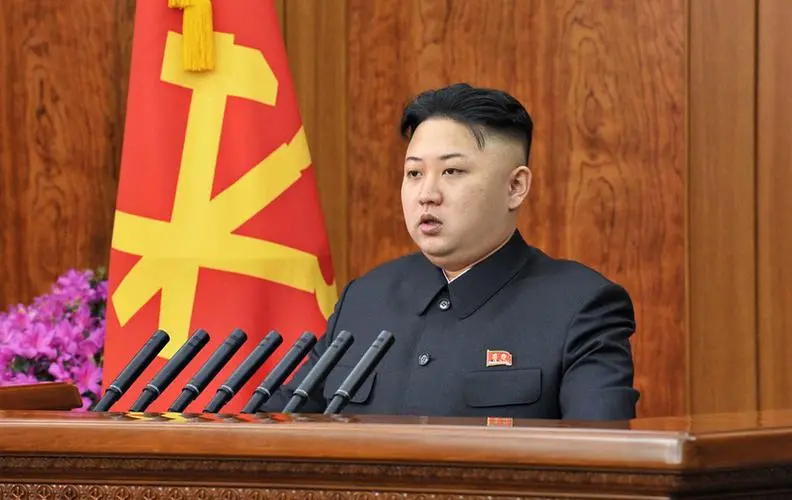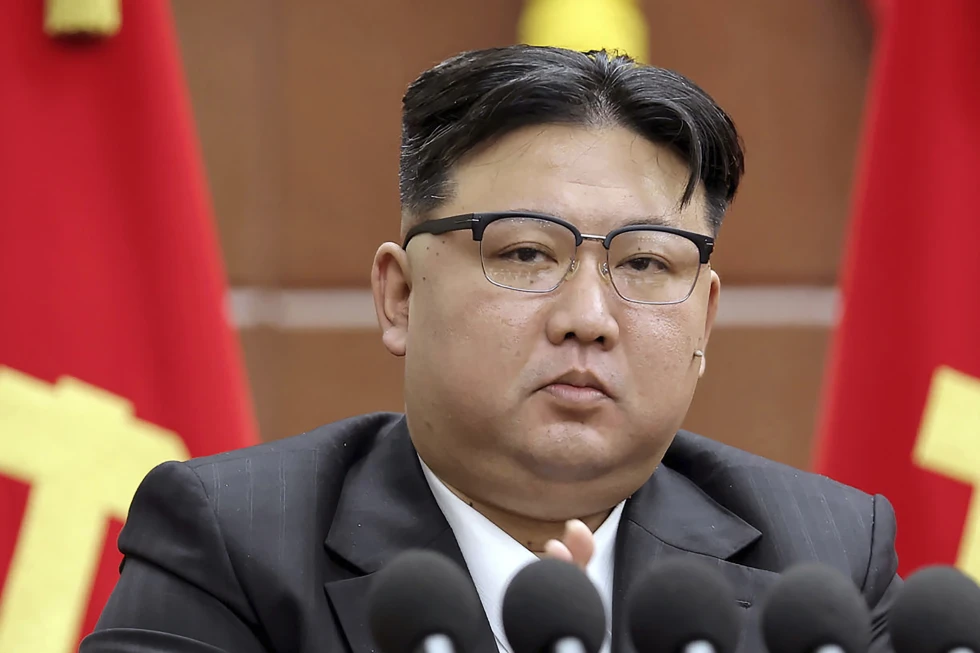The recent actions of North Korea, particularly its firing of cruise missiles into the waters off South Korea’s western coast, have once again escalated tensions in the region.
This provocative move comes amid increasing nuclear tensions with the United States, South Korea, and Japan, and serves as a stark reminder of the ongoing challenges posed by North Korea’s aggressive weapons demonstrations.
According to the South Korean Joint Chiefs of Staff, the U.S. and South Korean militaries are currently analyzing the details of these missile launches.
At this time, the exact number of missiles fired and their specific flight details have not been confirmed. However, what is clear is that these launches represent North Korea’s second known event of this nature in the current year.
The previous instance occurred on January 14, when the country test-fired its first solid-fuel intermediate range ballistic missile.
This development underscores North Korea’s relentless efforts to enhance its arsenal of weapons aimed at U.S. military bases in Japan and Guam.
The heightened tensions on the Korean Peninsula can be attributed to North Korean leader Kim Jong Un’s persistent pursuit of weapons development and his propensity for issuing provocative threats of nuclear conflict with the United States and its Asian allies.
In response to these actions, the U.S., South Korea, and Japan have been expanding their joint military exercises, which North Korea’s leadership portrays as invasion rehearsals.
Additionally, they have been refining their deterrence strategies, leveraging nuclear-capable U.S. assets to bolster their defense capabilities.
The implications of these recent events are significant and far-reaching. They underscore the pressing need for diplomatic efforts to defuse the escalating tensions and prevent further provocative actions.
The international community must remain vigilant and united in its commitment to upholding peace and stability in the region.
It is imperative for all stakeholders to engage in constructive dialogue and pursue diplomatic solutions to address the underlying issues driving the current state of affairs.
This will require a concerted effort to de-escalate tensions, foster trust, and work towards a peaceful resolution that ensures the security and well-being of all nations involved.
In conclusion, the recent missile launches by North Korea serve as a stark reminder of the complex and volatile nature of the geopolitical landscape in the region.
As the situation continues to evolve, it is essential for all parties to exercise restraint and prioritize diplomatic engagement as the primary means of resolving the underlying tensions.
Only through sustained dialogue and cooperation can a lasting and peaceful resolution be achieved in the face of the deepening nuclear tensions with North Korea.
In the latest tit-for-tat exchange, North Korea announced last week that it had conducted a test of a purported nuclear-capable underwater attack drone in response to a combined naval exercise by the United States, South Korea, and Japan.
In doing so, it placed blame on its rivals for tensions in the region. This development adds to the growing arsenal of weapons that North Korea has been testing in recent years, as it seeks to establish a credible nuclear threat against the United States and its Asian allies.
Since 2021, North Korea has carried out several flight tests of what it claims to be long-range cruise missiles.
According to North Korean assertions, these missiles have a range of 1,500 kilometers (932 miles), which would enable them to target nearly all of Japan and various U.S. military installations in the region.
The North has labeled these weapons as “strategic,” indicating an intent to equip them with nuclear warheads.
While North Korean cruise missile activities are not explicitly prohibited under U.N. sanctions, experts have highlighted the potential threat posed by these weapons to South Korea and Japan.
The design of these missiles, which allows them to fly like small airplanes and traverse terrain that makes them difficult to detect by radar, makes them particularly concerning from a security standpoint.
The recent developments in North Korea’s missile testing activities have raised significant concerns among regional and global stakeholders.
The continued pursuit and testing of advanced weaponry by North Korea has the potential to destabilize the delicate balance of power in the region and pose a direct threat to the security and stability of neighboring countries.
The actions of North Korea underscore the complex and multifaceted challenges posed by the proliferation of nuclear and missile capabilities in the modern geopolitical landscape.
The pursuit of advanced military technologies by states with aggressive or unpredictable foreign policies presents a clear and present danger to regional and global security.
The international community must remain vigilant and proactive in addressing the evolving security threats emanating from North Korea.
Diplomatic efforts, economic sanctions, and regional cooperation are essential components of a comprehensive strategy to deter and contain North Korea’s aggressive military ambitions.
Furthermore, the recent developments highlight the imperative of strengthening international non-proliferation efforts and reinforcing the norms and mechanisms aimed at preventing the spread of nuclear and missile technologies.
The potential consequences of unchecked proliferation of advanced weaponry are dire, and concerted international action is necessary to mitigate these risks.
In conclusion, the recent test of a purported nuclear-capable underwater attack drone by North Korea, in response to a combined naval exercise by the United States, South Korea, and Japan, underscores the ongoing challenges posed by North Korea’s pursuit of advanced military capabilities.
The international community must remain resolute in its efforts to address and mitigate the security risks associated with North Korea’s aggressive actions, and to uphold the norms and principles of international security and non-proliferation.
In the midst of an already tumultuous U.S. election year, concerns have arisen regarding the potential for North Korea to escalate tensions in the region.
Experts have suggested that the North Korean government may be seeking to increase its bargaining power in anticipation of negotiations with the eventual winner of the November presidential vote.
North Korea has a well-documented history of exerting pressure on South Korea in response to perceived slights from the United States.
In a recent address to the North Korean parliament, leader Kim Jong Un announced a significant shift in the country’s approach to its southern neighbor, declaring the abandonment of the long-standing goal of peaceful unification and ordering the rewriting of the North’s constitution to solidify South Korea as its primary foreign adversary.
Kim accused South Korea of acting as “top-class stooges” of the United States and reiterated the threat of using nuclear weapons to annihilate the South if provoked.
Analysts have suggested that North Korea’s actions may be aimed at undermining South Korea’s influence in the ongoing nuclear standoff and ultimately forcing direct negotiations with the United States in order to solidify its status as a nuclear power.
The potential for North Korea to exacerbate tensions in the region during a U.S. election year raises significant concerns about the stability and security of the Korean Peninsula.
The volatile nature of North Korea’s leadership, combined with its nuclear capabilities, presents a complex and potentially dangerous situation that must be carefully managed by the international community.
It is imperative that the United States and its allies remain vigilant and proactive in addressing the challenges posed by North Korea’s actions.
Diplomatic efforts must be intensified to prevent further escalation and to bring the North Korean government to the negotiating table in a manner that ensures the security and stability of the region.
The upcoming U.S. presidential election adds an additional layer of complexity to the situation, as the potential for North Korea to exploit political divisions and uncertainties in the United States for its own gain cannot be overlooked.
The next U.S. administration will face the daunting task of navigating the complex dynamics of the Korean Peninsula and addressing the persistent threat posed by North Korea’s nuclear ambitions.
In conclusion, the concerns surrounding North Korea’s potential to escalate tensions in a U.S. election year are a cause for significant apprehension.
The international community must remain vigilant and proactive in addressing the challenges posed by North Korea’s actions, and the upcoming U.S. presidential election adds an additional layer of complexity to an already volatile situation.
It is imperative that diplomatic efforts be intensified to prevent further escalation and to bring the North Korean government to the negotiating table in a manner that ensures the security and stability of the region.
In response to the original text, it is important to highlight the formal statement issued by South Korea’s military regarding North Korea’s recent actions.
According to the official report from South Korea’s Joint Chiefs of Staff, North Korea has indeed fired several cruise missiles into waters off its western coast.
This development is significant in the context of the escalating nuclear tensions with the United States, South Korea, and Japan.
The statement further emphasizes that both the U.S. and South Korean militaries are actively analyzing the launches.
However, at the time of the announcement, the exact number of missiles fired and their specific flight details had not been confirmed.
This underscores the need for thorough assessment and monitoring of the situation given the potential implications of North Korea’s actions.
Notably, these missile launches represent North Korea’s second known event of this nature in the current year, following a previous flight test-firing on January 14.
This earlier test involved the country’s first solid-fuel intermediate range ballistic missile, demonstrating North Korea’s ongoing efforts to advance its arsenal of weapons targeting U.S. military bases in Japan and Guam.

The heightened tensions on the Korean Peninsula are a cause for concern, particularly as North Korean leader Kim Jong Un continues to accelerate the country’s weapons development and issue provocative threats of nuclear conflict with the United States and its Asian allies.
In response, the U.S., South Korea, and Japan have been expanding their combined military exercises and refining their deterrence strategies, which are centered around nuclear-capable U.S. assets.
This dynamic underscores the complex and delicate nature of the geopolitical situation in the region.
In summary, the recent missile launches by North Korea represent a significant development in the ongoing geopolitical landscape, and it is crucial for all relevant parties to closely monitor and address these actions in a responsible and measured manner.
The potential implications of these actions on regional stability and international security cannot be understated, and it is imperative for diplomatic efforts and strategic coordination to be prioritized in addressing the evolving situation on the Korean Peninsula.
